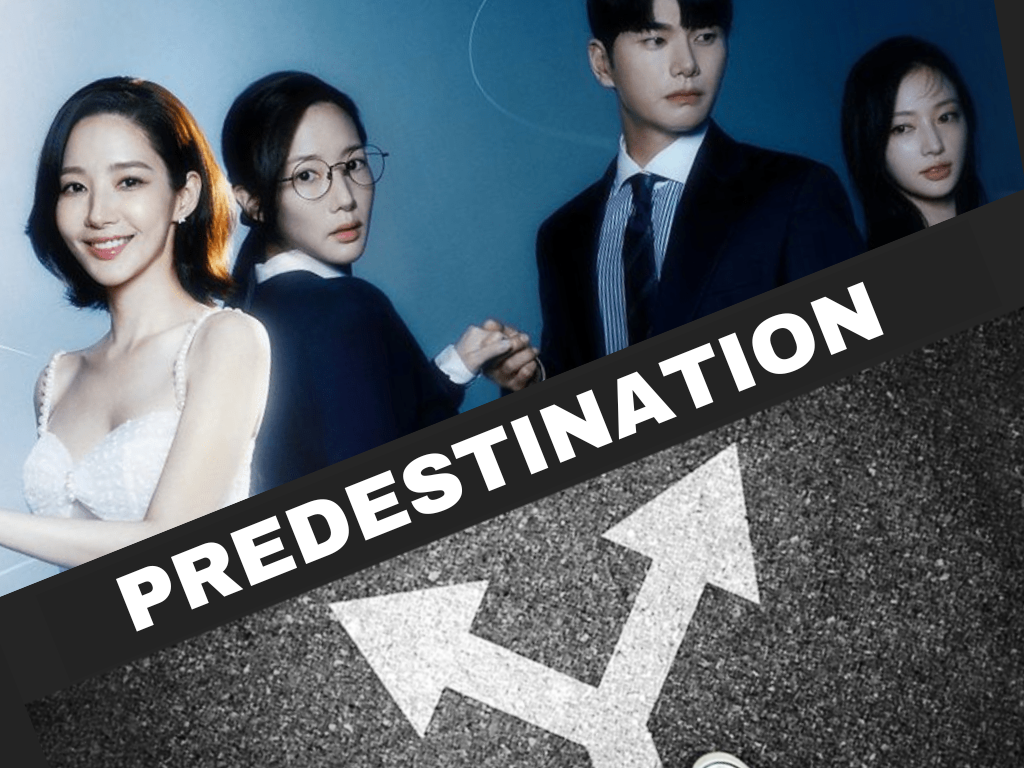“Marry My Husband” and Predestination
Marry My Husband is a Korean drama showing on Amazon Prime. The premise of the show follows a recent trend in Korean dramas of integrating magical realism into the plot, making for stories that range from fascinatingly complex to downright silly. Marry My Husband is about a woman named Ji-won who's killed by her husband and her best friend, who (minor spoiler alert) happen to be having an affair together. Ji-won then wakes up in her own body ten years earlier, reliving the days just prior to her engagement to her husband, but with full knowledge of what happens over the next decade. To top it all off, Ji-won, her future husband, and her best friend all happen to work at the same company in close proximity to each other, making for some awkward tension.
Because of her knowledge of future events, Ji-won's feelings about her husband, her friend, and herself are radically changed. She knows things about them no one else could know—not even themselves—with 100% certainty (as the show chooses to go with a fixed future rather than a fluid one). As a result, she sets herself on a plan of revenge, using her foreknowledge to punish her future husband and friend for sins she knows they’ll freely commit when the time is right.
Two Types of Foreknowledge
As implausible as this story is, it reveals something insightful about the doctrines of foreknowledge and predestination. There are certainly those who take a fatalistic or deterministic view of foreknowledge. On this view, God’s foreknowledge of future events and decisions cements them into time, making them inevitable. This view violates libertarian free will and forces one to concede that free will is merely an illusion or a manifestation of how our minds perceive the movement of time.
However, there’s no reason to adopt this fatalistic view of foreknowledge. God’s foreknowledge of what human beings will do doesn’t mean that they’re forced to do those things. In other words, what we will do does not equal what we must do. God may know that someone will freely choose to do something, but that person could have chosen otherwise. And if they had chosen otherwise, God’s foreknowledge would reflect that.
“God’s foreknowledge of what human beings will do doesn’t mean that they’re forced to do those things. In other words, what we will do does not equal what we must do.”
The advantage of the non-fatalistic view of foreknowledge is that it preserves both libertarian free will and moral responsibility. If I’m fated to commit a sin by God’s foreknowledge, an argument can be made that I’m not fully responsible or culpable for that sin since I was forced to do it. But if my free will is maintained and I commit that sin in my free will, then I’m fully culpable for my sin and God is justified in condemning me.
Being in God’s Shoes
Many people have a hard time either grasping or accepting the doctrines of God’s foreknowledge and predestination precisely because of their assumed effects on free will and responsibility. At first glance, predestination seems patently unfair; how could a fair and loving God create individuals who are predestined to go to hell and have no choice in the matter? That would make God out to be a monster.
But Scripture tells us that God is not unfair nor unloving. He is perfect in fairness, wisdom, and love (Rom. 2:11; 16:27; 1 John 4:16). This view of God is possible only if God actualized the world with perfect foreknowledge of what every person would freely choose during their lives.
“At first glance, predestination seems patently unfair; how could a fair and loving God create individuals who are predestined to go to hell and have no choice in the matter?”
This puts Ji-won in Marry My Husband in a similar position as God. Like God, Ji-won also has perfect knowledge of what her husband and friend will do in the future. She doesn’t make them kill her; she knows they make that choice completely on their own, for their own selfish reasons. Thus, Ji-won feels justified in taking her revenge out on them, knowing their guilt is both self-inflicted and well-deserved.
In one telling scene, Ji-won, speaking to herself, says (to paraphrase), “If the villains weren’t acting evil enough, I’d be hesitant to take revenge. But they don’t let up and continue to be relentlessly wicked. For this, I’m so thankful.”
“But through Ji-won, we can at least get a glimpse as to why God is justified in predestining some to salvation and others to damnation based on His foreknowledge.”
Viewers may not like what Ji-won is doing. The early episodes of the show clumsily suggest that her fate cannot be changed, only transfered to another person, which is presumably why she can’t just walk away from the situation. Her only choice, then, is to transfer her fate to someone deserving, namely, the villains. But through Ji-won, we can at least get a glimpse as to why God is justified in predestining some to salvation and others to damnation based on His foreknowledge.
After all, if viewers can accept and even sympathize with Ji-won’s judgment on the two villains, how much more ought we to accept and trust in God’s perfect judgments on humankind?


